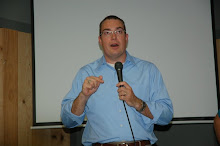
If you've been to a restaurant anytime in the past decade, this is how your server (formerly known as your waiter/waitress) addresses you. It is their job to make sure that you are served the things you order and make sure that your needs and wants are taken care of. They are in the "service" industry. Service is something that I take a hard look at, mostly because I come into contact with the service industry quite a bit. There is this elusive thing called "Customer Service". It is like the Loch Ness Monster of the service world. You are usually met on the customer service hot line with a recorded voice that instructs you to choose from several options. When you finally reach a "real" person, though, there is not much service of the customer going on. I usually hear nothing but the company line. The customer service person is not really there to help me but to help their company. This frustrates me a little. Can you tell? Jesus says in Matthew 20:28 that He came to serve and not be served. Now that's a novel concept and one that I thing the church would do well in adopting. This past Saturday, our church had 26 people doing community service projects around our town. We also had some folks from the Methodist church and another Baptist church helping too. You know, I never once heard someone complain about having to paint something, wash something, clean something or pick up something. There was a common goal to serve the people of our community in a visible and viable way. Most people of the community did not know who was doing the work, just that the work was getting done. Isn't that the true heart of service. Service is meeting the needs of people in a joyful way so as to improve and impact their lives. It is putting the needs of others above your own needs. It is helping others without the need of recognition. That is at the heart of service. So...whom will you serve today?







